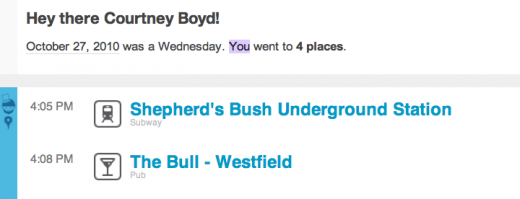Late one evening, I had been laying in mattress, swapping emails (regarding world domination) with my boss. After I could no more keep my eyes open,�I lightly closed my laptop alongside me and lay my mind back on my small pillows. Another later, recognizing I desired to create a security, I opened up up my Mac laptop Air again to shine light around the covers and so i may find my apple iphone within the sheets. I sleep with both products every evening which i m alone and thought this moment of hardware dependency was type of charming I even debated tweeting about this for any second.
Expensive forward 30 days and that i m laying on the beach with an island an hour or so from the coast of Puerto Rico. After I wasn t having fun with my new Kindle, I had been tweeting, Foursquaring, Instapapering, contacting and destroying lots of great photos with crappy filters as my boyfriend place it. But look, 12 people hearted it! I d answer. Also it s not crappy, this is Sutro.
While dining that evening (deep inside a discussion around the psychology of online discussing)�he pleaded, Look, this is not only you. This is the two of us. Let s switch off our phones not less than eventually. We ll unplug. We want this.
I attempted. However it was type of a #fail. As I didn t check email for 18 hrs, I grew to become the Foursquare mayor of La Pescaderia , a venue I d invented of�a rundown fishing pier where old males sitting around smoking cigars and selling fresh ocean bass and red-colored snapper. I additionally instagrammed the lobsters we bought. It wasn t just me. He used the map on my cell phone whenever we got lost and i'm confident he checked the Chelsea and Guy City scores after i is at the shower.
What exactly is it about use of technology which makes us crave it My pal quit Foursquare last Christmas within 24 hours he quit Snus. He s from the Snus, but back around the Foursquare. As we re drawing such pleasure from technology, so why do people seem like they have to quit �Has our digital happiness become just as essential as our in tangible existence happiness

Riding around the over-blown wave of recent You are able to City s current tech scene, over 100 excited New Yorkers filled a little room earlier this Thursday mid-day to attend�TEDxSiliconAlley.�Dr. Anna Akbari, a Digital Happiness Professor at New You are able to College required happens to go over a�framework for optimizing our associations with technology. We're merging with technology we're techno-physiques engaged at the office and play. Are we able to acquire a happiness that goes beyond digital and also the physical area, therefore changing right into a new condition to be she asks.
Akbari (pictured below) is just one of individuals happy people. Based on a number of tests, she s most joyful on Thursdays when focused, when on the date or when meeting with someone. She s the co-founder of�Bricoler Social Interaction Design, which uses social business software and social interaction methods to create organizations more collaborative, innovative, and for that reason more happy.�She s additionally a sociologist and professor within the department of Media, Culture, and Communication at New You are able to College, so she s naturally enthusiastic about how technology affects our human associations.

However, what's happiness �Akbari states happiness suggests an optimistic mood in our and an optimistic outlook later on.
Eudaimonia or eudaemonia (Ancient Greek Language: [eu dai mon�a]), sometimes Anglicized as eudemonia ( /ju d mo ni /), is really a Greek word generally converted as happiness or welfare however, human thriving continues to be suggested like a better translation.
And what's digital happiness
Based on Akbari, you will find 4 characterizations of the�possibilities�of�digital happiness or 4 areas we're making sensible utilization of technology.
- Identify: Technologies have the energy to recognize associations, wants and requires. Applications like HowAboutWe and Sonar�do this very well by curating the infinite number of individuals available to make available to you other people you d really wish to meet.
- Connect- Research conducted recently titled Happy People discovered that the 1 factor that�distinguishes�the most joyful people among us is the existence of strong group associations. Group texting applications like GroupMe and Fast Society, which centered this season s SXSWi are fantastic good examples of the way that technology might help us maintain strong group associations. I have a GroupMe group known as Best Family Ever, where my mother, father, brother and that i can keep in contact everyday just like we may round the breakfast table. Furthermore these group connections promote our happiness well-being, they considerably increase our overall human health.
- Track-Existence monitoring, also called existence logging is making huge waves as digital storage becomes cheaper and digital technologies like Foursquare for location, LearnVest for the finances, and voyurl for the web browsing habits, remove. With these programs, we're creating e-reminiscences in our digital selves that really help us find out more about our very own existence designs to create better choices for future years.
- Order- Technology provides for us order within our lives. Applications like Corkboard, Pinterest, CityPockets�help us�order and share the items we like. They're virtual tools to systemize our way of life. These power tools would be the virtual same as spring cleaning. And as the saying goes, hygiene is alongside godliness.

How come this magnificent applied science which saves work and makes existence simpler bring us so very little happiness The easy answer runs: Because we haven't yet learned to create sensible utilization of it.
-Albert Einstein, within an address at Cal Tech, 1931.
But technology and digital happiness isn t so obvious cut. Next, Akbari explores the 4�dichotomies of digital happiness.
The 4�dichotomies of digital happiness
1. Connect versus. Disconnect�
We ve found that people with strong social associations possess a greater possibility of survival. Besides digital happiness transform the recognized formula for the kitchen connoisseur, it redefines what it really way to be social. But could friending someone on Facebook result in enhanced durability
Maybe. However I do not think trolling Facebook for hrs and posting, poking and Liking will result in lengthy-term happiness. An excessive amount of technology can slow down our happiness. We must disconnect. We must continue periodic media fasts, a technology cleanse , for a moment. Switch off your phone and drink some wine. Disconnection can fuel creativeness and private identity construction too.�The Sabbath Manifesto s National Day's Unplugging�(NDU)�encourages us to show off technology from the specified Friday at sunset to Saturday at sunset.
2. Give versus. Take
Relinquishing privacy is fundamentally of enjoying the advantages of data aggregation. I sign in everyday using Foursquare, to ensure that I may have a record of everywhere I went. Every day I recieve an email from 4square&7yearsago that states, Twelve months ago today, October 27, 2010�was a Wednesday.�You�went to�4 places including Shepherd s Rose bush Subterranean Station, The Bull-Westfield, Platform 13 and South Terminal . As I never would ve appreciated that detail during my biological memory, my reliable e-memory pleasantly jogs my memory that last year today I met Zee in the Bull-Westfield we'd a beer and that i recognized employment in the Next Web.

The down-side of utilizing location based services continues to be stated by websites like Please Take advantage of Me, which supplies a 1-stop look for criminals attempting to find their next target by listing your available Foursquare and Gowalla checkins which are pressed to Twitter. If you re checking in, you re most likely not in your own home.
Therefore the more details you allow up, the greater you ll get. But we risk our privacy within this exchange. Which s an individual choice that does not everybody will accept, specifically discussion happens from a baby boomer and a�millennial.
3. Shallow versus. Deep
Based on transformative anthropologist Robin Dunbar, our minds are just large enough to deal with close associations with 150 people, for the most part.�But I've nearly 2,000 Facebook buddies and most double that in Twitter fans. Even though I wouldn t give them a call all buddies, the web has permitted us to cast very wide social nets.
American�sociologist�Mark Granovetter is known for his theory, The effectiveness of Weak Ties, prominent in Malcolm Gladwell s book The Tipping Point. The idea indicates that�our bigger, less strong ties are essential, otherwise more�beneficial�as they connect us to some bigger pool of individuals to drag assets from. Consider the final job you assisted someone get or even the last job someone assisted enable you to get. Was the one who made the introduction your closest friend or could it have been most likely your closest friend s boyfriend s more youthful sister, (or something like that from the sort)
Your digital happiness is definitely satisfied when something you published on Facebook receives 18 Likes. But could it be any comparison towards the happiness you are feeling when a family member appears with flowers and informs you the way much they appreciate you in tangible existence

4. Passive Activism
Whenever we think back at how technology particularly Facebook were utilized in this season s�revolutions�across the center East, Akbari sees a brand new type of social activism Passive Activism. People no more have to take towards the roads to protest. They are able to achieve this inside the convenience of their houses. Twitter has permitted us to participate a movement without really moving. It's good to possess passive activism or perhaps is it simply adding�unnecessary�noise and mislabeling comfortable complacency
How have existence and culture been changed by digital happiness
Since existence is no more just real existence , Akbari states we�must re-write our current rules of etiquette. This is tough to tell where we finish and technology starts. Our feeling of place regarding geography and identity is the fact that we re�simultaneous�here there. We re on the journey of connectivity that happens�symbiotically�between digitally mediated interactions as well as in-person�encounters.
In today s social setting, our phones are constantly positioned on the tables as well as on bar tops, just awaiting a third party to disrupt the scene.�A friend lately explained that you will find 2 kinds of people. Individuals who leave their phones up for grabs screen facing up and those that leave the screens facing lower. To help tangle the net, I actually do both based on who I m mingling with. And when I like you My phone is within my purse.�The legacy blog of etiquette author�Emily Post�is no more solely offering old advice. It even has�a post�on how to proceed once the office gossip transmits a Facebook request. (Ignore.)
In the end can recognize the advantages of existence monitoring technologies like Foursquare, RunKeeper and FitBit, we must request ourselves, when does existence logging become incessant Are these technologies encouraging individuals to love the record rather than as soon as And how come tugging out my phone to make use of Foodspotting or Foursquare in a restaurant cause me to feel feel so guilty Maybe you have attended the restroom to checkin a�restaurant If only that with such programs was in some way less awkward inside a world where not everybody is around the existence monitoring train.
Our life-style continues to be affected incidentally technologies have developed. Later on, it appears in my experience, we have to attempt to reverse this and thus develop our technology it meets the requirements of the kind of existence you want to guide.
-Prince Philip,�Males, Machines and Sacred Cows, 1984. (S&lifiers)
In addition, Akbari states we ll need to cope with new issues of morality and ethics. For instance, where's the road attracted in�digital�reality Where's cybersex around the cheating continuum Try getting that conversation together with your partner and tell me the way it goes.
Just like technologies as old because the toothbrush transformed our well-being, technology still transform our feeling of self. So, are these technology causing us to be more happy Akbari argues it s not the technology itself, its how it's used by us.�It s also who we're. She displays the architecture of happiness to become 50% genetics, 10% circumstance and 40% activities and practices, including our habits and traditions around technology.�Are you trolling Facebook in your phone since you re bored or are you currently utilizing it say hi to some friend who lives across water-feature Facebook isn t will make you content within the former instance, but it'll make you content within the latter.
Connected products contain the same eye-catching allure as gold. We are able to t take our eyes from it. But sometimes we have to just shut them back.�We must seek an account balance between our real and digital lives. We should make choices�affected�by moderation and purpose. Ultimately, this is not the technology itself, but who we're that�determines�our happiness.
No comments:
Post a Comment